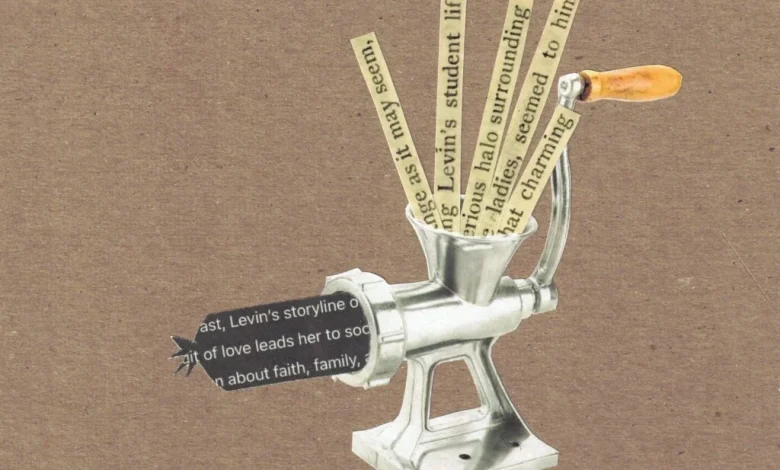English professors take individual approaches to deterring AI use

Jacinda Webber, Staff Illustrator
Without a departmental policy on the use of artificial intelligence, English professors are taking a range of approaches to confronting AI use.
There has been “no call” for a department-wide policy, Director of Undergraduate Studies Stefanie Markovits wrote in an email to the News, “most likely because we have a general belief in academic freedom in the classroom.” Professors are adapting in their own ways, but they agree on one thing: AI is detrimental to critical thinking and creative writing.
“To the extent that AI is used as a labor-saving assistant to construct sentences, arguments, and interpretations of literature, it is a shortcut that prevents a student from learning what it means to think one’s own thoughts and write with one’s own voice,” David Bromwich ’73 GRD ’77, a Sterling professor of English, wrote in an email to the News.
While Markovits prohibits AI use on essays, she wrote that she has colleagues who are more interested in the constructive use of AI for writing assignments, and she would “not want to deter that activity.”
Markovits added that one central guideline in the department is that professors be explicit on the AI policy for each class and assignment. Her understanding is that faculty are “not meant to put student work into AI detectors,” she added, citing the Poorvu Center’s AI and academic integrity guideline, which notes that there is “no tool or method to detect AI use with any certainty.”
‘They wouldn’t dare give me an AI play’
In the absence of a departmental policy, professors are dealing with AI on their own. Rasheed Tazudeen, who teaches two sections of the department’s introductory writing seminars, said that the prevalence of AI has partly influenced him to adopt a “fairly regressive” no-tech policy this year.
This semester, he banned laptops in the classroom outside of specific activities that require them. He bought every student a notebook, and printed readings are required. This format, he said, allows students to be better connected to readings and to each other — and prevents them from accessing AI in class.
“I don’t want to be asking questions about a text or something and if a student has a laptop open might be getting ChatGPT responses,” Tazudeen said in an interview. “That’s what I was really trying to avoid as well because I can ask ChatGPT myself. I really want to know what the students think.”
Theater professor Deborah Margolin, who teaches playwriting, said she would “recognize an AI scene in a second.” The human voice is so integral in the craft of playwriting that AI could not produce a convincing product, she said. She does not include a specific AI policy in her syllabus beyond her plagiarism policy.
“It hasn’t changed my practice at all, and I don’t believe it’s changed the practice of my students in regard to this particular field of study,” she said. “No one’s going to give me an AI play. They wouldn’t dare give me an AI play.”
When asked what she would do if a student turns in a seemingly AI-generated play, Margolin said she would leave a comment reading, “This is an extremely unoriginal piece of work, and I really expect better. You better give me something better next time. This is flat, dull, unoriginal and unacceptable.”
She said she would give the student a D or D- since they “at least printed out the paper and stapled it.”
According to Markovits, students learn to think about literature deeply through the “nitty-gritty process of writing about it.” Using AI “in any manner” not sanctioned by professors seriously impedes this process, she wrote.
“I understand it can seem attractive with a deadline looming, but it just defeats the point of the exercise of writing,” Markovits added.
Tazudeen agreed. Good writing and good art come from “a struggle with you and the blank paper or the blank canvas,” and he doesn’t want students to lose out on that process, he said.
Tazudeen said he has had students start an essay in class with handwritten notes, which helped him “get a sense of their style.” Discussing essay ideas with students also allows him to “get a sense of how the paper is emerging,” he said.
“I want your ideas and your thinking, your originality,” Tazudeen said. “I think that’s a large part of it, too, is just not letting the students go into a black box and then produce a paper at some point over the last four weeks or something and, from my perspective, not having any idea where the ideas come from.”
When Tazudeen receives a paper that seems AI-generated, he said, he talks to the student and, if the paper turns out to be AI-generated, asks them to redo the assignment or weigh the next assignment to replace the paper. This process is less of a punitive mechanism because he doesn’t want his classroom to feel like “a space they need to be worried about,” he said.
“It’s a way of, rather than being punitive, just getting them to work harder at being original,” he said.
Markovits thinks “most of our majors value the human craft of writing” and that the “vast majority” of her students’ work was composed without AI, she wrote. She does expect to see more exams and in-class writing exercises in English classes, she added.
Tazudeen said that he hasn’t noticed a broad change in the quality of writing submitted in his classes.
“The best students are always going to be the best students,” he said. “The students that tried hard and did the best work and did the most original, creative thinking in the ’90s are the same ones in the 2000s, the 2010s, 2020s.”
While Tazudeen noted that teaching English doesn’t feel too different than five years ago — he still prepares ideas for seminar discussions and gets students to write about texts — he said it will be a “challenge for all of us doing any kind of university instruction” to think about AI as students arrive to college with more experience with AI.
English was the seventh-most popular major at Yale in the 2024-25 school year.
Update, Oct. 29: The illustration for this story has been updated.
Jaeha Jang covers faculty for the News. He is a sophomore in Pierson College majoring in English and economics.





